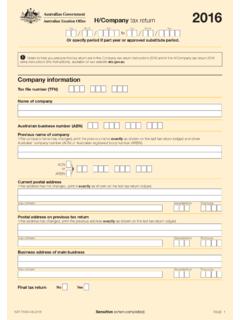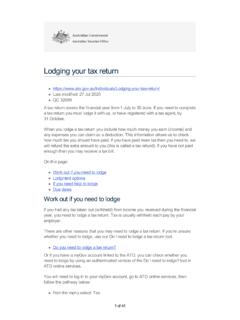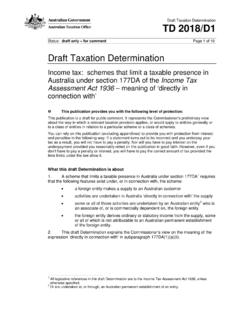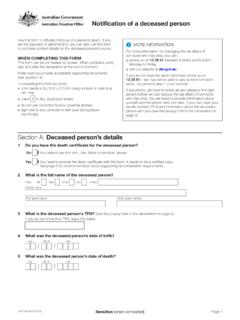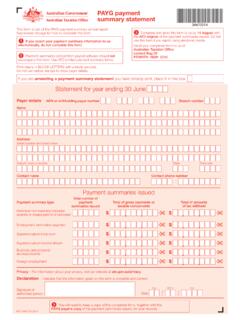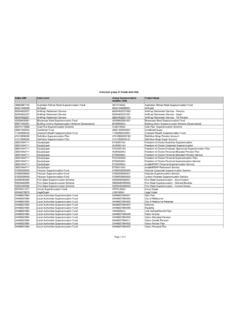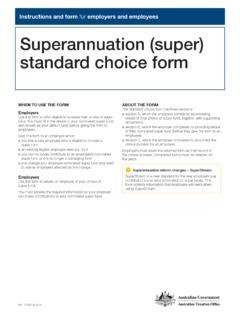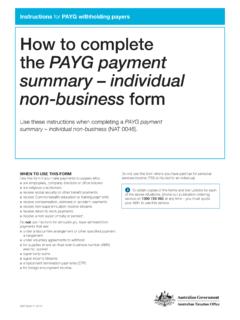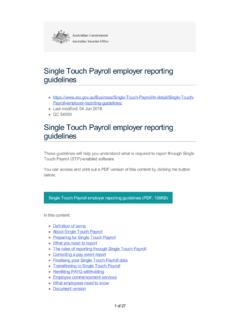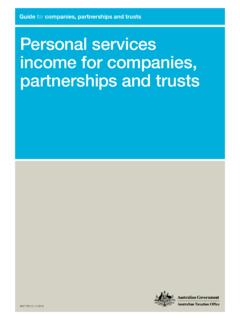Transcription of Rental properties 2020 - Australian Taxation Office
1 For more information go to properties2020 This guide explains how to treat Rental income and expenses, including how to treat more than 230 residential Rental property itemsGuide for Rental property ownersOUR COMMITMENT TO YOUWe are committed to providing you with accurate, consistent and clear information to help you understand your rights and entitlements and meet your obligations. If you follow our information in this publication and it is misleading or turns out to be incorrect and you make a mistake as a result, we must still apply the law correctly. If that means you owe us money, you must pay it but we will not charge you a penalty. Also, if you acted reasonably and in good faith we will not charge you interest. If correcting the mistake means we owe you money, we will pay it and pay you any interest you are entitled you feel that this publication does not fully cover your circumstances, or you are unsure how it applies to you, you can seek further help from us.
2 We have a Taxpayers Charter which will help you understand what you can expect from us, your rights and obligations and what you can do if you are not satisfied with our decisions, services or actions. For more information, go to and search for Taxpayers Charter helping you to get things right .We regularly revise our publications to take account of any changes to the law, so make sure that you have the latest information. If you are unsure, you can check for more recent information on our website at or contact publication was current at May 2020. Australian Taxation Office FOR THE COMMONWEALTH OF AUSTRALIA, 2020 You are free to copy, adapt, modify, transmit and distribute this material as you wish (but not in any way that suggests the ATO or the Commonwealth endorses you or any of your services or products).PUBLISHED BYAustralian Taxation Office Canberra June 2020DE-12552 Rental properties 2020 1 CONTENTSINTRODUCTION 3No deductions for vacant land 3 Tax and Covid-19 3 Tax and natural disasters 3 Publications and services 3Is your Rental property outside Australia?
3 3 Rental INCOME 4 Rental -related income 4Co-ownership of Rental property 4 Rental EXPENSES 7 Types of Rental expenses 7 Always check your supplier s ABN 7 Expenses for which you cannot claim deductions 7 Expenses for which you can claim an immediate deduction 9 Expenses deductible over a number of income years 20 Keeping records 32 WORKSHEET 33 OTHER TAX CONSIDERATIONS 34 Capital gains tax 34 General value shifting regime 35 Goods and services tax (GST) 35 Negative gearing 35 Pay as you go (PAYG) instalments 35 RESIDENTIAL Rental PROPERTY ASSETS 36 Definitions 36 Residential Rental property items 38 MORE INFORMATION 47 Website 47 Publications 47 Phone 48 Other services 48 Rental properties 2020 3 Rental properties 2020 will help you, as an owner of Rental property in Australia, determine: n which Rental income is assessable for tax purposesn which expenses are allowable deductions n which records you need to keep n what you need to know when you sell your Rental , but not all, of the expenses associated with Rental properties will be deductible.
4 This guide explains: n how to apportion your expenses if only part of them are tax deductible n what expenses are not deductiblen when you can claim those expenses that are deductible some you can claim in the tax return for the income year in which you spent the money others must be claimed over a number of years (including decline in value of depreciating assets and capital works expenses).The examples given in this publication featuring Mr and Mrs Hitchman are based on the assumption that the Hitchmans own their Rental properties as joint tenants who are not carrying on a business of letting Rental you own a Rental property, you may also need to know about: n capital gains tax (CGT)n general value shifting regimen goods and services tax (GST)n negative gearingn pay as you go (PAYG) guide explains these at pages 34 DEDUCTIONS FOR VACANT LANDYou can no longer claim tax deductions for the cost of holding vacant land.
5 These changes apply to costs incurred from 1 July 2019, even if you held the land before that more information, go to and search for Deductions for vacant land .TAX AND COVID-19 Your Rental property income and deductions may have been affected by COVID-19. For more information, go to general information about ATO measures and support during COVID-19, go to AND NATURAL DISASTERSWe have special arrangements for people affected by natural disasters such as a cyclone, flood or fire occuring during the financial year. For more information, go to and search for Dealing with disasters . If your tax records were lost or destroyed, we can help you to reconstruct them, and make reasonable estimates where our emergency support team on 1800 806 218 and we can discuss the best way we can help can also:n fast track refundsn give you extra time to pay debts, without interest chargesn give you more time to meet activity statement, income tax and other lodgment obligations, without penaltiesn help you if you are experiencing serious AND SERVICESTo find out how to get a publication referred to in this guide and for information about our other services, see More information on page 47.
6 IS YOUR Rental PROPERTY OUTSIDE AUSTRALIA?If your property is located outside Australia, special rules apply to the deductibility of your Rental property expenses. For more information on foreign source income, see question 20 in Individual tax return instructions supplement 2020. If you are unsure of your obligations, contact your recognised tax adviser or us. INTRODUCTION4 Rental properties 2020 Rental INCOMEYou must include as Rental income any assessable amounts relating to limited recourse debt arrangements involving your Rental property. For more information, see:n Limited recourse debt arrangements on page 32n Guide to depreciating assets 2020 (NAT 1996).CO-OWNERSHIP OF Rental PROPERTYThe way that Rental income and expenses are divided between co-owners varies depending on whether the co-owners are joint tenants, tenants in common or there is a partnership carrying on a business of letting Rental income and expenses according to legal interestCo-owners who are not carrying on a business of letting Rental properties must divide the income and expenses for the Rental property in line with their legal interest in the property.
7 If they own the property as:n joint tenants, they each hold an equal interest in the property n tenants in common, they may hold unequal interests in the property, for example, one may hold a 20% interest and the other an 80% income and expenses must be attributed to each co-owner according to their legal interest in the property, despite any agreement between co-owners, either oral or in writing, stating otherwise. EXAMPLE 1: Joint tenantsMr and Mrs Hitchman own an investment Rental property as joint tenants. In the relevant income year, Mrs Hitchman phones us and asks if she can claim 80% of the Rental loss. Mrs Hitchman says she is earning $67,000 a year, and Mr Hitchman is earning $31,000. Therefore, it would be better if she claimed most of the Rental loss, as she would save more tax. Mrs Hitchman thought it was fair that she claimed a bigger loss because most of the expenses were paid out of her wages. Under a partnership agreement drawn up by the Hitchmans, Mrs Hitchman is supposed to claim 80% of any Rental told Mrs Hitchman that where two people own a Rental property as joint tenants, the net Rental loss must be shared in line with their legal interest in the property.
8 Therefore, the Hitchmans must each include half of the total income and expenses in their tax agreement that the Hitchmans might draw up to divide the income and expenses in proportions other than equal shares has no effect for income tax purposes. Therefore, even if Mrs Hitchman paid most of the bills associated with the Rental property, she would not be able to claim more of the Rental property deductions than Mr Hitchman. Rental and other Rental -related income is the full amount of rent and associated payments that you receive, or become entitled to, when you rent out your property, whether it is paid to you or your agent. You must include your share of the full amount of rent you earn in your tax return. Your Rental income also includes rent or associated payments that you receive, or become entitled to, when renting out part or all of your home through the sharing economy or the renting of your holiday and associated payments may be in the form of goods and services.
9 You will need to work out the monetary value of these. For example, if the tenant gives you property or goods as rent instead of money, you include the market value of the property or goods as Rental income in your tax INCOMEYou must include Rental bond money as income if you become entitled to retain it, for instance, because a tenant defaulted on the rent, or because damage to your Rental property required repairs or you received an insurance payout, there may be situations where the payout needs to be included as income, for example, if you received an insurance payment to compensate you for lost rent. If you received a letting or booking fee, you must include this as part of your Rental payments include all amounts you receive, or become entitled to, as part of the normal, repetitive and recurrent activities through which you intend to generate profit from the use of your Rental you received a reimbursement or recoupment for deductible expenditure, you may have to include an amount as income.
10 For example, if you received:n an amount from a tenant to cover the cost of repairing damage to some part of your Rental property and you can claim a deduction for the cost of the repairs, you need to include the whole amount in your incomen a government rebate for the purchase of a depreciating asset, such as a solar hot-water system, you may need to include an amount in your income. For more information, see Taxation Determination TD 2006/31 Income tax: is a government rebate received by a Rental property owner an assessable recoupment under subsection 20-20(3) of the Income Tax Assessment Act 1997, where the owner is not carrying on a property Rental business and receives the rebate for the purchase of a depreciating asset (for example, an energy saving appliance) for use in the Rental properties 2020 5 EXAMPLE 2: Tenants in commonIn example 1, if the Hitchmans owned their property as tenants in common in equal shares, Mrs Hitchman would still be able to claim only 50% of the total property , if Mrs Hitchman s legal interest was 75% and Mr Hitchman s legal interest was 25%, Mrs Hitchman would have to include 75% of the income and expenses on her tax return and Mr Hitchman would have to include 25% of the income and expenses in his tax return.
